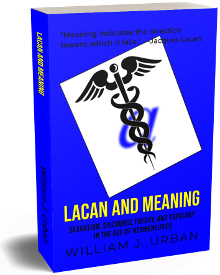LACAN AND MEANING
SEXUATION, DISCOURSE THEORY, AND TOPOLOGY IN THE AGE OF HERMENEUTICS
CHAPTER 2
WITHDRAWALS FROM MEANING
— page 38 —
2.2 Structuralism
[H]ermeneutics and semiology are two ferocious enemies.
—Michel Foucault
With the arrival of structuralism in the early 20th century, a very different withdrawal from meaning presents itself. Like in phenomenology, meaning becomes an object of study. But sourcing meaning to the intentions of consciousness is deemed mistaken. From the structuralist perspective, such a strategy amounts to an ad hoc intuitive response which abandons any serious attempt to place investigations of meaning on sure methodological footing. Indeed, structuralism is fervently anti-humanist in its own aspirations for scientificity. It situates the locus of meaning entirely within the confines of language. Accordingly, a full account of the constitution of meaning can be had by exclusively examining linguistic structures – a method suggested by its very name. To be sure, structuralism puts the crucial accent on the structural parts of language, and not on the meaningful wholes they compose. It undertakes a systematic study of the basic elements of language, especially in their relations of combination and contrast to one another. The further assumption that the resulting linguistic figures are arbitrary in nature forces an additional focus on the particular functions they serve in the larger components of language. Overall, the meaningful effects of language hold secondary interest for structuralism, as its primary task is to uncover language’s internal dynamics. The following section first discusses two classical structuralists, and then turns to a few so-called ‘post-structuralists’ from the 1960s onward. Whereas the former analyze language atemporally and without any consideration for subjectivity, the latter’s rejection of the centrality of structure relaxes these constraints. Differences aside, they all demonstrate structuralism’s general withdrawal from the field of meaning to a non-meaningful domain, the formal framework of language which effectively delimits this field.
A concerted turn from meaning is already accomplished by Saussure, the father of structuralism. This is reflected in his very choice of theoretical object. Significantly, la parole [speech] is set aside for an exclusive focus on la langue [language]. He argues that the individual utterances of the former only execute possibilities already existing in the latter. This is not to say that Saussure would, for instance, turn a deaf ear to the spoken kerygma to directly take up written Scripture. For language is to be examined in its pure abstraction from the diversity of concrete languages. This notion of abstraction is novel in itself. But la langue also breaks with theories of the past in a more literal sense. Whereas 19th century philology gave significant thought to historical factors, Saussure analyzes language as if it were frozen in a moment of time. In later structuralist terminology, he opts for a synchronic rather than a diachronic approach. The diversity of concrete languages is thus no opportunity to offer yet another meaningful narration of the mythical fall from the one primeval language.
« prev next »full text of Lacan and Meaning
FREE Lacanian-themed puzzles

